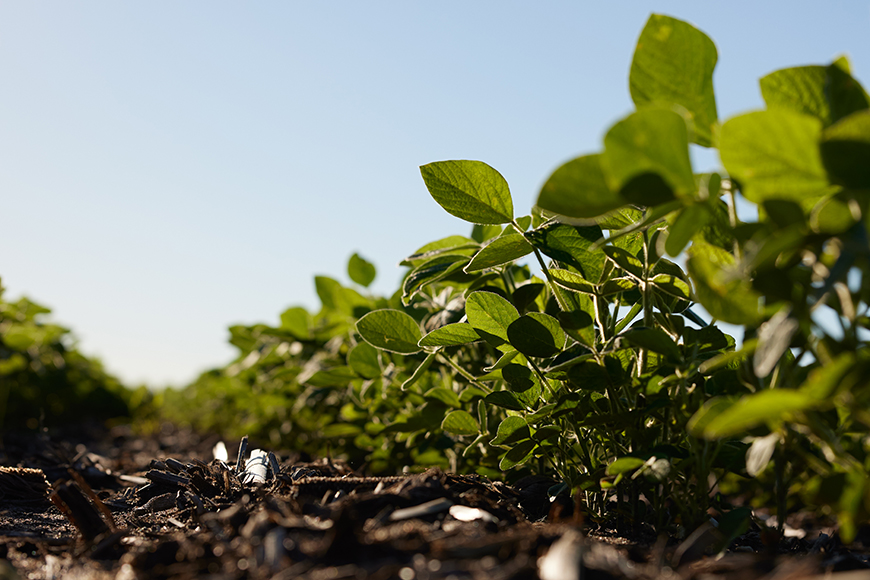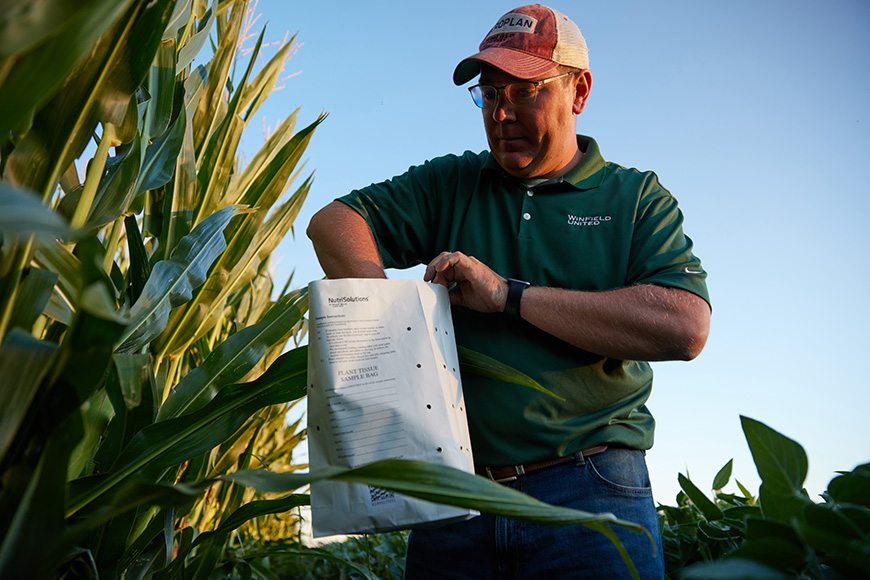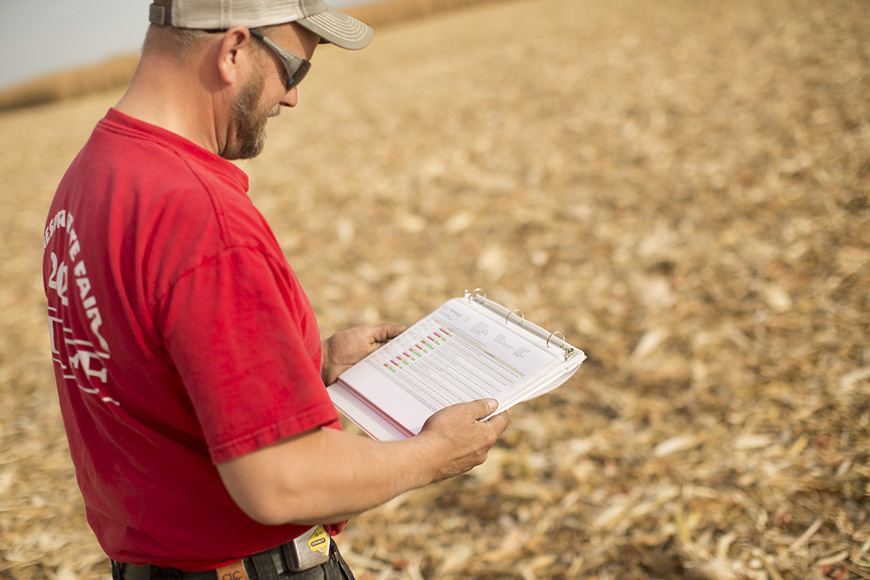Enhance Plant Nutrition With Biologicals

Keeping up with a crop’s nutritional needs throughout the season requires a thoughtful strategy to maximize the return on your investment. Traditionally, fertilizer efficiency (the percentage of applied nutrients used by that season’s crop) has been low, especially for nutrients like nitrogen and phosphorus. The University of Nebraska reports that corn, sorghum and soybean crops generally use less than 10% of the applied phosphorus during the application year.
Is there a way to improve fertilizer efficiency? Could biologicals be the answer? Let’s explore how these products can help enhance crop nutrient uptake and maximize the potential of your plant nutrition investment.
Vault® IP Plus Seed Treatment by BASF contains the nitrogen-fixing Bradyrhizobium japonicum rhizobial strain plus a dual-strain biofungicide to help protect soybean roots against Fusarium and Rhizoctonia. This dual-action soybean seed treatment helps plants start strong and ensures they have the nitrogen they need to sustain healthy growth throughout the season.
Once you’ve answered these questions, you can begin to understand which types of biologicals may be a good fit for your operation. For example, suppose tissue sampling results show that your plants aren’t taking up enough phosphorus from the soil. In that case, it may be worth considering a biological that can help with nutrient solubilization.
In addition, some biologicals improve root access to soil nutrients, increasing fertilizer efficiency. The bottom line is that biologicals can help get more nutrients into the plant, which enables you to maximize the ROI potential of your plant nutrition investment.
The WinField United BioVerified designation list is a great place to start, but validating products in your fields is also a good idea. Run strip trials to evaluate how different products perform before going all in on something new. As you gain comfort with new products, introduce them more widely across your acres.
Biologicals are one of the fastest growing markets in the industry right now, and they will continue to evolve. Your WinField United retailer can keep you informed and recommend products that are a good fit for your acres.
All photos are either the property of WinField United or used with permission.
© 2024 WinField United. Important: Before use always read and follow label instructions. Crop performance is dependent on several factors many of which are beyond the control of WinField United, including without limitation, soil type, pest pressures, agronomic practices and weather conditions. Growers are encouraged to consider data from multiple locations, over multiple years and to be mindful of how such agronomic conditions could impact results. Ascend2, BioVerified and WinField are trademarks of WinField United. All other trademarks are the property of their respective owners.
Is there a way to improve fertilizer efficiency? Could biologicals be the answer? Let’s explore how these products can help enhance crop nutrient uptake and maximize the potential of your plant nutrition investment.
How Do Biologicals Enhance Nutrient Uptake?
Generally, there are four ways in which a biological product may contribute to enhanced nutrient uptake. These include:- Nutrient solubilization
- Root branching/hyphae extension
- Nitrogen fixation
Vault® IP Plus Seed Treatment by BASF contains the nitrogen-fixing Bradyrhizobium japonicum rhizobial strain plus a dual-strain biofungicide to help protect soybean roots against Fusarium and Rhizoctonia. This dual-action soybean seed treatment helps plants start strong and ensures they have the nitrogen they need to sustain healthy growth throughout the season.
- Physiological modification
Are Biologicals a Good Fit for My Plant Nutrition Program?
There is a lot of conflicting information about biologicals, so it’s natural to question whether they fit into your plant nutrition program. Every biological works differently, so it’s best to start with an audit of your current practices and fertility program. Here are some questions to ask yourself:- What is working well with my plant nutrition program?
- What gaps do I see in my current practices?
- What do soil and tissue sampling results reveal about my fertilizer efficiency?
- Are any environmental conditions consistently limiting nutrient uptake in my fields?
- Do my crops have the nutrients they need during critical growth periods?
Once you’ve answered these questions, you can begin to understand which types of biologicals may be a good fit for your operation. For example, suppose tissue sampling results show that your plants aren’t taking up enough phosphorus from the soil. In that case, it may be worth considering a biological that can help with nutrient solubilization.
Can Biologicals Help Reduce Nutrient Costs?
Biologicals are gaining interest from farmers partly due to the rising cost of fertilizing a crop. As mentioned, biologicals can help unlock soil nutrients that are unavailable for plant uptake and increase the efficiency of soil-applied nutrients.In addition, some biologicals improve root access to soil nutrients, increasing fertilizer efficiency. The bottom line is that biologicals can help get more nutrients into the plant, which enables you to maximize the ROI potential of your plant nutrition investment.
How Can I Evaluate the Performance of Biological Products?
With so many biologicals on the market, it’s hard to know which ones live up to the hype. That’s why we created the WinField® United BioVerified™ designation. Products on the list have been evaluated against four key criteria that matter to farmers: product uniqueness, solid agronomics, operational compatibility and economic return. Only the highest rated biological products receive the WinField United BioVerified designation.The WinField United BioVerified designation list is a great place to start, but validating products in your fields is also a good idea. Run strip trials to evaluate how different products perform before going all in on something new. As you gain comfort with new products, introduce them more widely across your acres.
Biologicals are one of the fastest growing markets in the industry right now, and they will continue to evolve. Your WinField United retailer can keep you informed and recommend products that are a good fit for your acres.
All photos are either the property of WinField United or used with permission.
© 2024 WinField United. Important: Before use always read and follow label instructions. Crop performance is dependent on several factors many of which are beyond the control of WinField United, including without limitation, soil type, pest pressures, agronomic practices and weather conditions. Growers are encouraged to consider data from multiple locations, over multiple years and to be mindful of how such agronomic conditions could impact results. Ascend2, BioVerified and WinField are trademarks of WinField United. All other trademarks are the property of their respective owners.





